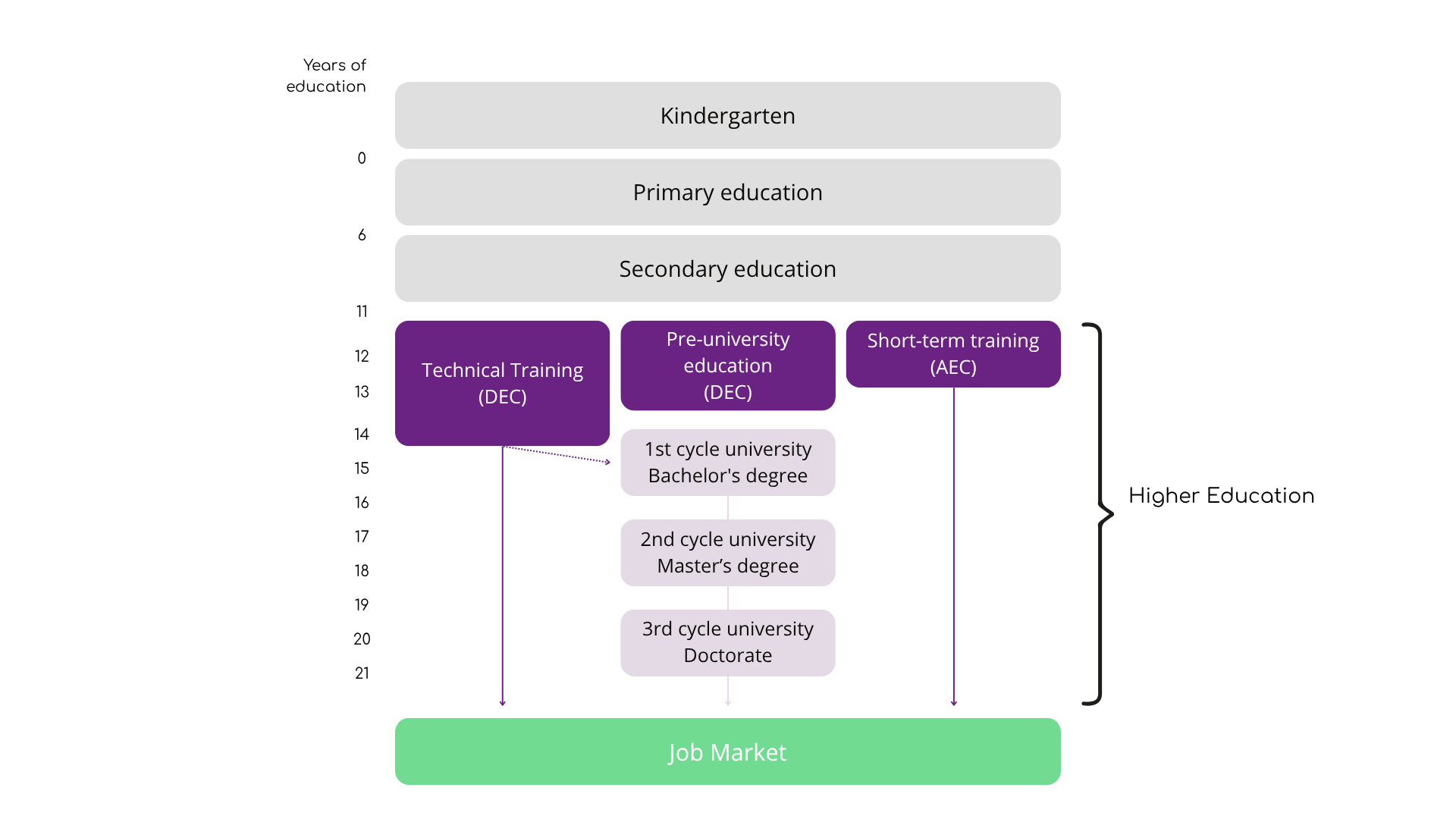Cégeps – Considering Higher Education Abroad?
Discover:
-
What a cégep is and why it’s unique
-
How to choose the right cégep for you
-
The simple and accessible Québec education system
-
Services available to international students
-
Financial aid options
What is a Cégep?
Cégep stands for "Collège d’enseignement général et professionnel" (College of General and Vocational Education). In Québec, Canada, it is a public educational institution that provides the first level of higher education.
All pre-university and technical programs leading to a Diplôme d’études collégiales (DEC) are sanctioned by a state diploma issued by the Ministry of Higher Education. Attestations of College Studies (AEC) are awarded by the institutions (cégeps)

Programs for Everyone
Short-term programs, that lead to an Attestation of College Studies (AEC).

Study in Your Language of Choice

High Employment Rate

Recognized Pedagogy

Applied Research Leaders
How to Choose the Right Cégep
If your program is offered in several institutions, how do you choose the one that suits you? Here are some factors to consider:
Geographic Location
Student Housing
Available Activities
Program Characteristics at This Cégep
The same program may be offered by several cégeps; however, each cégep's specifics could influence your choice. For example, is there an opportunity to do a practical internship in the workplace through this cégep? Consult our cégep search tool and the cégeps' websites to compare the particularities of the programs.

The Québec Education System
While "cégep" is unique to Québec, the level of technical higher education is taught worldwide. Clarify your understanding by consulting the diagram and information below:

Educational Levels in Québec
Primary and Secondary Education
In Québec, compulsory education begins with primary school (kindergarten is not mandatory) and consists of six years of study, followed by secondary school spanning five years. The diploma obtained upon successful completion of general secondary studies is the Diplôme d’études secondaires (DES), granting access to higher education.
Another type of secondary education exists: vocational training, leading directly to the workforce.
Higher Education: Cégep
Cégeps primarily offer two types of programs:
- Technical programs: Last three years (six sessions) and lead to employment. Most technical programs include practical internships, often paid. If desired, one can also pursue university studies after this type of training.
- Pre-university programs: Last two years (four sessions) and lead to university. They can be interesting alternatives for international candidates who do not have the necessary prerequisites to access university immediately but wish to complete university studies in Canada.
Upon completion of these two types of programs at cégep, students obtain a Diplôme d’études collégiales (DEC), which is a state diploma.
A third type of program at cégep is short-term training leading to an Attestation of College Studies (AEC).
Higher Education: University
In Canada, university studies are divided into three levels:
- Bachelor's degree: Equivalent to a license in France
-
Master's degree
-
Doctorate
What to Do After Your Cégep Studies? Continue Studying or Return to Your Home Country?
Continue Studying
Once you have your diploma, you may decide to continue your studies. In your final year at cégep, you can apply for admission to a Québec, Canadian, or foreign university. Most cégeps have orientation services that will provide advice for your university admission.
Be sure to inquire well in advance about the prerequisites and requirements of university programs. Indeed, you may lack prerequisites if you wish to change fields. Your academic results will also be decisive for your university admission, especially for limited-capacity programs.
Return to Your Home Country
If you wish to return to your country after your studies in Québec, your diploma will not automatically be recognized in your home country.
If you are a European citizen, you will need to initiate a diploma recognition process with the official ENIC-NARIC body (ENIC: European Network of Information Centres in the European Region / NARIC: National Academic Recognition Information Centres in the European Union).
